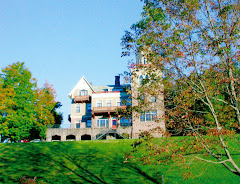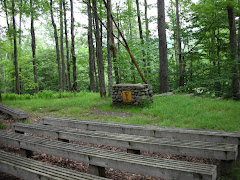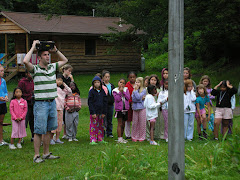This blog has for several years been driven, entry by entry, by photos and videos. Sometimes what I write, in words, is not much more than a caption. And yes, pictures tell great stories and sometimes all you need, if you are a longtime FV'er but are not here now, is a photo or video to remind you of the scene you once loved and now miss terribly and crave.
And, yes, sometimes the photos do send me into narrative about this or that day, or this or that amazing achievement by a child, or this or that remarkable natural fact about this Valley. I'm not trying to undersell the entries here that pictorially depict Frost Valley doing its miraculous thing for children and their variously hard-pressed families. (Oh, how many families are hard-pressed in one way or another!)
Well, I forgot to bring my camera to last night's activities and to breakfast this morning, and so found myself thinking about how the past 12 hours or so might be narrated without images.
The narration adds up to a tour of the inside of a social miracle.
This morning, just as Camp Wawayanda started the walk to breakfast (7:50 AM or so), it began to pour. A real storm - and, what with the cool temperatures we've been experiencing (the low last night was in the upper 40s and it was barely 60 when I re-entered the main part of camp at 7 AM), it was the perfect recipe for a quiet and maybe even somber breakfast. But mellow and together are the words that came to mind, and soggy and probably mostly happy-tired people, campers and counselors, shared the eggs, sausage and home fries, got their yogurt and cereal, the counselors their tea and coffee, and sat with each other talking in low tones about the day ahead - whether the rain would subside, whether the Scavenger Hunt scheduled for second period for Outpost would actually come off, whether Geronimo for all of MAC could be moved under the big tent. I sat at the directors' table and they were going about their remarkable business of trying to understand what every single camper had experienced the day before, mostly, of course, knowing the problems small and great (mostly small, though). They perceive all this, at least initially, through the cabin-by-cabin daily reports. The forms are filled out by every counselor (well, one report per cabin) every single day.
The daily reports really moved me this morning. I used the term "heart-breaking" to Sam Martinelli, who was glancing at them with me. Not heart-breaking as in terribly sad. Heart-breaking as in gratified: overwhelmingly, I felt respect for the remarkably detail and quotidian quality of the feelings report having been felt, the degree to which each activity was fun or not fun by each camper, etc. Each child "rates" the day before: on a scale of 1 to 5. Most were 4 or 5 (it had been a beautiful and good day), but several were a 2 or even 1. There was always an explanatory note for these low ratings: the child misses grandpa, who's been ill; another child had been stung by an unintended slight from another child; another was disappointed that her favorite game had to end early; another lost a towel. What moved me more was how each counselor - remember, they themselves are young people, most of them campers themselves not many years earlier - wrote out their plan to offer the right dose of TLC, described exactly how things could get better, precisely what steps could be taken to help. "I want my campers to learn to listen better to each other," wrote one counselor. One boy, in Outpost, is the son and nephew of Frost Valley campers/staff who did memorable things here for a whole generation in the 70s and 80s, and he's been feeeling a little low, a feeling not helped by a bruised knee and a thumb that got bent back a few days ago and was still a little sore. I made a point of chatting with him toward the end of breakfast, and, with his counselors, will spoke enthusiastically about the day head: second period was going to be that Scavenger Hunt. He brightened, and when I told him that his dad and his aunts had had slow and low days here, even here in this heaven, he realized - and described this in words to me! - that even the most campy of camp people have a down day, and the thing to do is push through it and see what new adventure awaits. Camp is especially good for a child who tends to feel like that. It's not only for those who rate the previous day a "5" (the vast majority) or: "15" or "INFINITY" or "GOOGLEPLEX" or "so great I don't know a number" (all quotes from this morning's reports). And: "The kids in the cabin are really getting along well now. It's so great!" And: "I don't know where all this unity came from but yesterday was the turning point." And: "Camp is really good for M. at this moment in her life, and she talked about all that at Devo."
Last night I told three stories to three groups, starting at 9:30. A long good night. The stars were out and it was really cold. I spoke with each group at dinner and urged them to build big campfires out in the open so we could see the stars as I told the story. The stories almost always go well. But sometimes my tongue gets a little tied, or I fail to remember some detail of these ridiculously elaborate stories. And to make things more challenging for the old guy, last night I was to tell three different stories in succession, each of them complex in their own right and, taken together, a true tangle of complexity. Surely I would mix one up with the other in the middle of the telling. But the settings were perfect, the kids so ready to be told a tale, the stars so bright, the sound of the rivers and streams around us providing such an ambient swoosh/rushy sound - I was on my game, and all three tellings were perfect and the campers responded with gratifying snapping and oooohs/aaaahhhs, and thank-yous at the end. First Forest, on the hill that used to be Outpost, a great fire-ring (the best for seeing stars, actually): "The Doubletop Plane Crash Mystery." Then, starting at 10:15, Lenape, in the first-ring just outside of Hird Lodge: "Sawmill, 1958." Then, starting at 11, most of the CITs, gathered around the fire-ring on the Castle lawn just to the west of the old Castle tennis court: "The Lights over the Lake."
At midnight I visited a CQ fire. Another fire. Low quiet talk among friends about.....the children. That just never stops, even during the one or two hours off. Remarkable. Good young people. As I wandered up the hill, ready for sleep, I encountered one of the camp directors. We had a 10-minute talk about the difficult nuances of his day. He sought some larger context and in the end we stopped talking and found ourselves just looking up. That night sky, bracketing the Valley and its sleepy people, provided the largest context anyone could ever need. The big picture, not metaphorically.
Earlier that evening, as I had walked away from the story at Forest, a 10-year-old Forester came running after me to ask one more question about Doubletop Mountain. After I explained a little further, he said: "So when we're here we live on Doubletop?" Yes, in a way - we live on a slope of a ridge of the mountain. "So it's our mountain." Yes, you could say that. "I want to climb to the top of Doubletop." Some day you will, I'm sure. Come back every summer. "I want to." Why do you want to get up there? "Because it's really hard."
Because it's really hard. The girl who needs camp right now and says so at devo. Camp is hard but it's good and it's a "5." The boy who's bruised and feeling down, and accepts the invocation of his Frost Valley family as a reminder that he will inevitably push through. Camp is hard for L. but it's very good. And to today, I'll bet, L. will give a "5." Or maybe even....INFINITY.
Everyone needs this. Including yours truly.
Search This Blog
blog archive
-
▼
2014
(202)
-
▼
July
(97)
- Lenape seesaw
- a day inside this miracle
- another trustee visits
- the graceful new counselor
- Geronimo - in action
- session 3 faces
- leadership meeting views
- Blum Center plans now available!
- stars of the 00's return
- what CITs look like after an activity with Pokey-T...
- Checking out from session 2
- The Tilles/Nathanson/Shapiro nexus
- Debbie Reich
- Rock me, Wawa
- what Tacoma says on the last day of the session
- listen to the voices of Susky cabin 49
- observers
- Olympics redux
- Turrell Way
- 1909
- A team
- Susky!
- Olympics, behind the scenes
- trustee's happy grandchild at the Farm
- Olympic Day lunch (wave your flag)
- they made the 2014 Olympics possible
- Mikia Eatman visits
- Olympics!
- High Falls
- Devil's Hole and Brother's Hole
- grandmother day
- now Hemlock
- demonstrating what not to do
- flyfishing cottage
- is the sky here blue enough?
- when years later you run into a person you knew wh...
- banana sandwich, of course
- two unrelated Schneiders are back
- Morris
- Pokey-Totem is back from their overnight
- they will run the place in a few years
- pre-pre-Olympics hysteria
- Clara wins a Bud Cox shirt
- themed Challenge Night: 1980s workout look; 1960s ...
- late night at Sequoia
- K.C. is back, volunteering for a week!
- she wins a Challenge Night t-shirt
- MAC folk
- CITs: away they go
- two Toys
- photos from the last day of session 1
- Jon Cryer and his mom, Lalani
- Windsong
- CITs prepare for their long hiking trip
- first-day activity: untie the knot of the group
- Outpost will make a CQ fire, no matter the weather
- Biscuit Creek flowin' fast
- Sacker back
- trustworthy trustee help
- Brock/Kelcourse - back again
- Family Camp memories
- Simon Says
- Geron is back
- Zabriskie redux
- more on the triumphant return of Tucker/Gordon
- happy staff at the close of first session
- another alumna sends her child to camp
- the Schechters, a Frost Valley family
- Bud Cox: "Lion Hunt" once more
- the man surveys the scene
- counselor and camper reunion
- cool Pokey-Totem cats
- an extra pair of hands for the Lakota staff
- Moira Poe visiting
- What do you do if you are a CIT and waiting for ac...
- A.'s performance: affection flowing both ways
- hoopla: "The Hill"
- theme day in ascendency
- distance from Frost Valley is no obstacle
- 2014 Challenge Night t-shirt
- July 6th fireworks!
- what happens when people just like each other
- son of former camper and staffer
- Rick Kaskel on the absence of Fenn Putman
- self-image in this valley
- contorted and proud of it
- Forest cabin
- technology basket: put your cell phones here
- dear camp friends
- a whole village of painted staff
- another Zabriskie
- counselor outfit match
- Challenge Night look-alikes
- The Red Apple Rest: rest in peace
- what kids say (another installment)
- counselors are the kind of people willing to be pa...
- the A Team ready to go on the second morning of camp
-
▼
July
(97)
summer camp blog
about Al
why do this?
It seemed time to gather together photos and recordings. I'd always hesitated because I didn't want to imply that my own take was definitive. The blog--the medium of the blog--seems the right combination of diary-like subjectivity (blog readers simply know this is the blogger talking) and a communal forum for various perspectives and multiple stories.
Castle depicted in old postcard

get email updates from this blog
If a new entry is added on any day, you will receive a brief email notice of it.
new at my blog
Wawayanda chapel in early July

Old Wawayanda
When I die let my ashes
flow down Biscuit River,
let 'em roll on in water
the color of sky.
I'll be halfway to heaven
at a New Wawayanda,
saying "Wawayanda spirit
it never did die."
flow down Biscuit River,
let 'em roll on in water
the color of sky.
I'll be halfway to heaven
at a New Wawayanda,
saying "Wawayanda spirit
it never did die."
in memoriam alumni tree

planted at September 2006 reunion
links
sunset at Friendship House

Al's hand-motion antics at opening campfire

Frost Valley
is a place where good things happen when people pay attention to each other. There’s endless beauty here - the high meadows, blankets of evergreens, and pristine brook trails – and you can meet nature in all its forms. But more than that, it’s a place where our ties to friends and family are strengthened. When a community of people came to the Catskills to build Frost Valley, they had in mind a place where you can sit next to someone you think you know, and then really get to know them. It also happens to be where the everyday light and shadow is enough to inspire artists; where American fly-fishing was born; and where today, a quarter million acres of green forests still remain “forever wild.” At Frost Valley, where we are does have an effect on how we treat each other. Here, a family can relearn what “family style” means as they share a meal together. The rose-gray river stones in the hearths and chimneys around camp reflect the colors of nearby Biscuit Creek and pull you into the surroundings. If you need more reasons why it’s so special here, we encourage you to explore citizen science activities during every season. But you don’t have to, because you might have more fun just learning silly camp songs. And by the end of your stay, when you your family and newly found friends are composting like pros together, everyone becomes richer, including next year’s butterfly garden.
after lunch, inevitably Dave King

...and if I could transport myself
not just back to this place, but to a certain moment in my personal history here, it would perhaps be:
end of lunch on any July day in 1968, and Dave King (our camp director) walks to the center of the dining hall, without microphone, and without introduction of any kind begins to lead one of the 25 or so camp songs we sang in those days. He is the maestro, waving one arm to the rhythm we are to follow and with the other arm, at turns, directing us to sing quietly or loudly or pointing toward some one camper who isn't singing or (rarely) is talking. And it's "Young Folks Old Folks" or "Zum Gali Gali" or "Deep and Wide" and I look down to the end of the table at my counselor and he's singing too, no hesitation, not too old for this, totally entranced and I myself turn my gaze back toward Dave....
Okay, I ache for that. Not being young again, not quite. More like being momentarily again part of such harmony.
end of lunch on any July day in 1968, and Dave King (our camp director) walks to the center of the dining hall, without microphone, and without introduction of any kind begins to lead one of the 25 or so camp songs we sang in those days. He is the maestro, waving one arm to the rhythm we are to follow and with the other arm, at turns, directing us to sing quietly or loudly or pointing toward some one camper who isn't singing or (rarely) is talking. And it's "Young Folks Old Folks" or "Zum Gali Gali" or "Deep and Wide" and I look down to the end of the table at my counselor and he's singing too, no hesitation, not too old for this, totally entranced and I myself turn my gaze back toward Dave....
Okay, I ache for that. Not being young again, not quite. More like being momentarily again part of such harmony.
save Frost Valley's Monarchs
ache
"The blog is awesome - I just went back through the whole thing again. I'll say this without shame - I ache for Frost Valley. I spend a lot of time and cerebral metabolism trying to devise a way I can get back up there for a session...."
waterfront 1961

looking in the direction of Wildcat Mtn. and the boathouse (which is off to the left)
definition of "Village Chief"
Village Chief \vil aj cheef\ n: An overworked, underpaid, camp official expected to be everything to everyone, including, but not limited to, Counselor, Mediator, Motivator, Programmer, Administrator, Police Officer, Caretaker, and Supervisor, all while maintaining good working relationships with parents, campers, counselors and support staff, and without whom any summer camp would struggle to function adequately.
Wawayanda flag raising

July 2006
Dot Conklin
is an original Catskills denizen. She has family scattered all across the region, she knows all the old stories about one-room schoolhouses, what this Claryville house was used for in the old days, and so on. Dot was the first recipient of a recent annual staff award, and when she received this honor everyone stood and applauded, tears in their eyes. Finally a chance to recognize a true community elder - hard working, honest, a kind & beautiful soul. [LINK]



